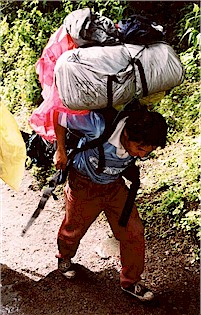|
• The Historic
Sanctuary of Machu Picchu was inscribed as a UNESCO
World Heritage cultural and natural site in 1983 and comprises about 80,000
acres. Its protection is mandated under the U.N. convention as well as Peruvian
law. There is potential for Machu Picchu to be added to the endangered sites
list which entitles it to special attention and international assistance.  more more
• Admission increased from $10 to $20.
• The contract that the government had
awarded to Peru Hotels SA to build the cable car concession has been suspended.
The opposition by UNESCO was cited as one of the reasons for the suspension of
the project.
• In 1999, the United Nations expressed
concern that the visual quality of the area was already seriously affected by
the existing tourist infrastructure - which includes a small hotel, bathrooms,
ticket office, terrace restaurant and bus parking lot - and recommended that
current facilities be reduced. These recommendations have not been implemented.
• Programa Machu Picchu, a
conservation program funded through a debt-swap arrangement with the Finnish
government, is being implemented to strengthen the administration of the
sanctuary and establish strategies for protecting the environment and the
development of the town of Aguas Calientes. Its accomplishments to date include
the implementation of fire-prevention and waste-management plans.
• Currently, foreign tourists are allowed
to ride the local train in addition to the tourist trains. Local trains may be
limited to Peruvian nationals only in the future.
• UNESCO says that visitor number should
be cut to 800 visitors, and says they should wear soft shoes to reduce pressure
on the ruins
• The indigenous people of Peru are
actively involved in working to preserve their spiritual and cultural heritage.
The nongovernmental organization Yachay Wasi, based in Cuzco, has campaigned for
the recognition and protection of the spiritual heritage of Peru’s indigenous
people. In 2001, Yachay Wasi sent a letter to the UNESCO World Heritage Centre
requesting that Machu Picchu be recognized as a sacred site and that indigenous
peoples play a major role in its protection so that incidents such as the
chipping of one of the site’s most significant sacred structures, the
Intihuatana or “hitching post of the sun†by advertising agency film
crews don’t happen again. As a result, Yachay Wasi was invited to take part in
the proposed UNESCO World Heritage Indigenous Peoples Council of Experts with
the aim of ensuring that indigenous concerns, including sacred site protection,
be included in U.N. agendas.
• The town of Aguas Calientes will now
receive 10 percent of ticket receipts from Machu Picchu to improve the
infrastructure, including sewage and waste treatment.
• Authorities in Peru have submitted a
$130m plan (19.4.2005) to the UN's cultural arm,
Unesco, to preserve Machu Picchu. The UN body has warned Peru that the famous
site might lose its world heritage status if they do not act to protect it.
The proposals in a 400-page report are believed to include satellite monitoring
to measure earth movements and a daily limit of 2,500 tourists.
• The Peruvian government has reversed a
decision to allow flights over the Inca ruins of Machu Picchu after an outcry
from environmental groups. more |
• Entry fee will
be raised from U.S. $17 to $50 for full trail.
• Independent hikes, i.e., hikes without
an authorized Inca Trail Guide, are no longer permitted. Two guides for groups
of more than seven tourists.
• Group size may not exceed 15 visitors,
and no more than 40 total, including guide, cook, porters and crew.
• There will be a limit of 500 people per
day allowed to begin the trek - about 200 tourists and 300 guides and porters.
• Right now, Inca Trails slots need to be
booked three to six months in advance.
• Porters will not be asked to carry more
than 20 kilos.
• Groups may not stay more than four
nights on that portion of the Inca Trail that lies within the Machu Picchu
sanctuary.
• The trail will be closed one month each
year for maintenance (January or February).
• Only licensed tour operators are
permitted to sell Inca Trail packages.
• Assigned camp sites with proper toilet
facilities must be used.
• All rubbish must be carried out of the
Trail.
• Only certain types of fuel to be used.

Overloaded porter on the Inca Trail
|